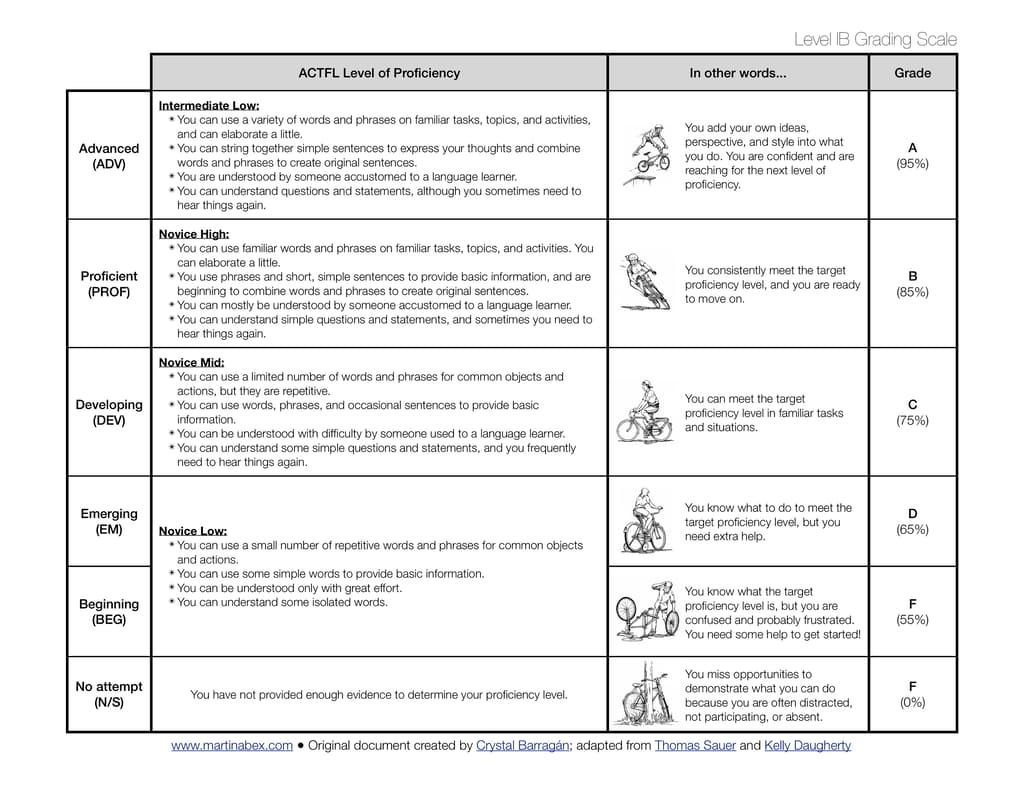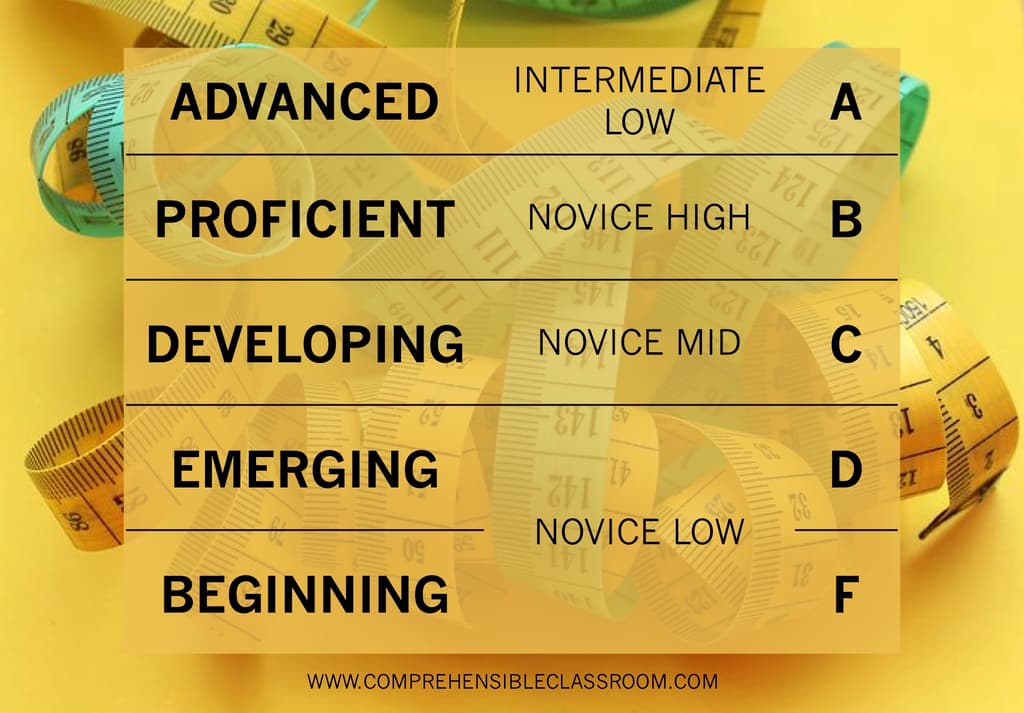This is my third year using Standards Based Assessment, and I’m hooked.
WHY I LOVE STANDARDS BASED ASSESSMENT
Reason #1: My students have a clear, measurable goal for my class, instead of a GPA goal.
Throughout my entire school career, my goal was to earn a 100. An A. A 4.0. Or higher, if I was allowed extra credit! No matter what subject, the objective was the same: perfection. But what did perfection get me??
When I switched to Standards Based Grading, my students traded in their goal of perfection (or passing) for a progress goal on the path to proficiency. Instead of aiming for a 100, they were aiming to perform at Novice High on the ACTFL Proficiency Scale. They had to learn about the Proficiency Guidelines and to learn what the differences are between a Novice and an Intermediate. They had to understand how we learn language and what is needed to progress from sub-level to sub-level.
Finally! We had a mission. And the mission was possible for everyone!

Reason #2: My students' grades reflect their performance in the language, not their performance as a student.
In my old grading system (quizzes, tests, homework, classwork, projects, participation), students could earn high grades by simply being a good and responsible student, and all the language ability in the world could not keep a ‘slacker’ student from achieving a high grade. The frustrated teacher in me liked this because I liked rewarding students that worked hard and “punishing” students that didn’t. “See! You have a D because you never turn in your work!”. But that is not just. My course is called “Spanish”; not “Work Habits”. My students’ grades should reflect their ability to interpret and produce the language.
My categories are now Reading Comprehension (25%), Presentational Writing (25%/20% depending on level), Listening Comprehension (25%), Presentational Speaking (20%/15% depending on level), Culture (5%), and Work Habits (5%). I do not grade Interpersonal Speaking. More on Work Habits below.
*NOTE: I later changed the category weights, and I eliminated the culture category.
Reason #3: The grades that my students receive carry meaning; they are not just arbitrary numbers.
When my students receive an assignment, there is a word written on the top of it: “Advanced”, “Proficient”, “Developing”, “Emerging”, “Beginning”, or “No Attempt”. This word is their score, and it communicates to them how their performance on the assignment matches up with the standard for that skill in the course, and it corresponds to a letter/number grade (because my school was not set up for a true standards based grading system, in which there are no numbers). You can download the Performance targets rubric that I use for my students here.

Each word corresponds to Advanced/A/95%, Proficient/B/85%, Developing/C/75%, Emerging/D/65%, Beginning/F/55%, and No Attempt/F/50%, and to ACTFL proficiency levels. For an example, please see this document that I created by combining the ideas of about a million different brilliant minds (it’s free!):
REASON #4: I have fewer Fs and Ds, but not fewer As.
Most students have As and Bs because I am focused on their proficiency and I know that if my students are getting Cs and Ds on assignments, it’s not because they are lazy and not doing their work but because they don’t understand the material. When I work with students to bring up their grades, we are working on input; we are working in the language--not scrambling to finish assignments. Typically, my students’ grades go UP as the year goes on instead of down.
Why does it matter that I have fewer Fs and Ds?
Because Fs and Ds suck, that's why. Because low grades ruin students' lives. They take away opportunities. They give students an identity that I don't want to give them. Fs and Ds are the worst, and historically they have very little or nothing to do with a students' command of the content.
I have fewer Fs and Ds because my students are progressing on the path to proficiency; because I am doing things in class that improve linguistic proficiency, and my students are responding. Fewer of my students earn Fs and Ds because we are a team, and our team is working.
Reason #5: Nomenclature communicates place on the path to proficiency; not a completed task.
Even though my students are well aware that an Advanced is the same as an A and an Emerging is the same as a D, I have found that this simple change in language has a profound impact on students' mindset. It inspires students to work to meet the standard; to push up to the next level.
An “F” communicates “FAILURE”--an ending--whereas a “Beginning” shows that there is hope and that the student is just at the beginning of the journey. Students WANT to jump to the next level. If they’re Developing, they want to be Proficient. If they’re Proficient, they want to be Advanced! I also like it because students know that they cannot improve their grades by doing extra credit or handing in missing assignments. They have to perform better in order to improve their grade, and so they look for ways to improve their proficiency in order to bring up their grades. It is FANTASTIC!!
Best of all, I have students re-take my course BY CHOICE after they have failed to move on to the next level (D or F). Instead of battling with me about repeating the course, we arrive at a mutual agreement that the student needs more time soaking in the language in order to meet the standard necessary to move on to the next level. I think that that is the most wonderful testimony to the hope that this grading system gives them. My students do not believe that they have failed; instead, they believe they need more time in the language to become proficient. I LOVE IT!

WORK HABITS
The great conundrum caused by Standards Based Grading, of course, is how to hold students accountable for anything but summative assessments. Some schools issue two grades for their students: one for their content performance and one for their behavior/study habits. I wish this were the case for me! My solution is the Work Habits category. It’s only 5% of my students’ grades, and it includes formative assessments, participation, attendance, behavior, work completion, etc. It’s a catch-all. It is such a low percentage that it has almost no affect on their final grade, but it’s something. It’s a grade that I can point to at Student Led Conferences or mention in a phone call to show their parents tangibly how “studious” their child has been.
I believe that it is very important that even an extremely low grade in Work Habits (namely, an F) not bring the students’ overall grade down more than a single letter. In most situations, students’ progress on the path toward proficiency has already suffered because of their poor work habits, and so adding on additional punishment simply to 'stick it' to them is really not necessary. For that reason, if you have the ability to weight categories at ZERO (where you can keep a record of assignments but they have no impact on the final grade in the course), I say--GO FOR IT!




